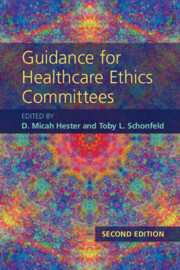Book contents
- Guidance for Healthcare Ethics Committees
- Guidance for Healthcare Ethics Committees
- Copyright page
- Dedication
- Contents
- Contributors
- Preface
- Section 1 The Context of Healthcare Ethics Committee Work
- Section 2 Consultation
- Chapter 7 Ethics Consultation Mission, Vision, Goals, and Process
- Chapter 8 A Method of Consultation
- Chapter 9 Informed Consent
- Chapter 10 Confidentiality and Privacy
- Chapter 11 Decision-Making Capacity
- Chapter 12 Discharge Challenges
- Chapter 13 Surrogate Decision Making
- Chapter 14 Advance Care Planning and End-of-Life Decision-Making
- Chapter 15 Potentially Inappropriate Treatment and Medical Futility
- Chapter 16 Cognitive Dissonance and the Care of Patients with Disorders of Consciousness
- Chapter 17 Ethical Issues in Reproduction
- Chapter 18 Ethical Issues in Neonatology
- Chapter 19 Ethical Issues in Pediatrics
- Chapter 20 Neuroethics
- Chapter 21 Ethical Issues in Clinical Genetics
- Chapter 22 Challenging Issues in Surgical Ethics
- Chapter 23 Psychiatric Ethics
- Section 3 Policy Development and Organizational Issues
- Index
- References
Chapter 17 - Ethical Issues in Reproduction
from Section 2 - Consultation
Published online by Cambridge University Press: 17 February 2022
- Guidance for Healthcare Ethics Committees
- Guidance for Healthcare Ethics Committees
- Copyright page
- Dedication
- Contents
- Contributors
- Preface
- Section 1 The Context of Healthcare Ethics Committee Work
- Section 2 Consultation
- Chapter 7 Ethics Consultation Mission, Vision, Goals, and Process
- Chapter 8 A Method of Consultation
- Chapter 9 Informed Consent
- Chapter 10 Confidentiality and Privacy
- Chapter 11 Decision-Making Capacity
- Chapter 12 Discharge Challenges
- Chapter 13 Surrogate Decision Making
- Chapter 14 Advance Care Planning and End-of-Life Decision-Making
- Chapter 15 Potentially Inappropriate Treatment and Medical Futility
- Chapter 16 Cognitive Dissonance and the Care of Patients with Disorders of Consciousness
- Chapter 17 Ethical Issues in Reproduction
- Chapter 18 Ethical Issues in Neonatology
- Chapter 19 Ethical Issues in Pediatrics
- Chapter 20 Neuroethics
- Chapter 21 Ethical Issues in Clinical Genetics
- Chapter 22 Challenging Issues in Surgical Ethics
- Chapter 23 Psychiatric Ethics
- Section 3 Policy Development and Organizational Issues
- Index
- References
Summary
Few areas of medicine raise issues more contentious than those generated by the intersection of health care and reproduction. From decisions about disposal of reproductive tissue, to the provision of contraception and abortion, to delivery decisions at the threshold of fetal viability, to issues about intervention and care in pregnancies to be carried to term, the potential for disagreement – and deep disagreement – may lead to requests for input from healthcare ethics committees (HECs).
- Type
- Chapter
- Information
- Guidance for Healthcare Ethics Committees , pp. 149 - 156Publisher: Cambridge University PressPrint publication year: 2022



